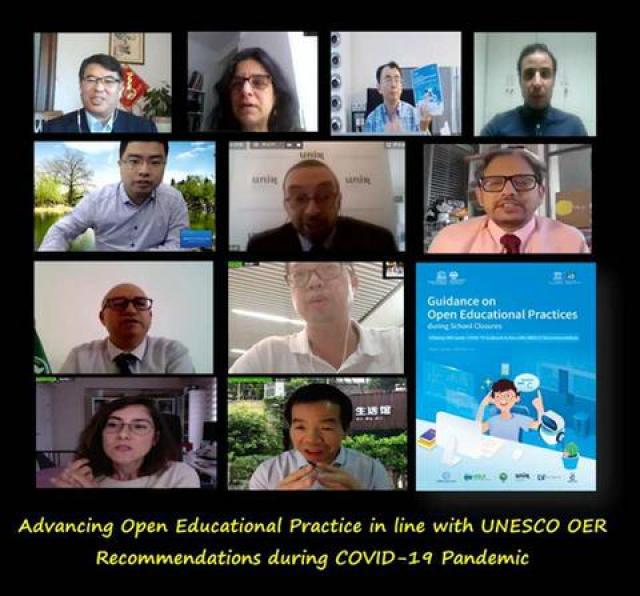Explore Future Educational Forms, Application of Open Educational Practice——The Webinar entitled “Advancing Open Educational Practice in line with UNESCO OER Recommendation during COVID-19 Pandemic”

On May 8, 2020, an international webinar entitled “Advancing Open Educational Practice in line with UNESCO OER Recommendation during COVID-19 Pandemic” was held at 20:00-22:10 (GMT+8). The webinar was organized by the Smart Learning Institute of Beijing Normal University (SLIBNU), UNESCO Institute for Information Technologies in Education (UNESCO IITE) and UNESCO International Research and Training Centre for Rural Education (INRULED), co-hosted by Arab League Educational, Cultural and Scientific Organization (ALECSO), International Association of Smart Learning Environments (IASLE), Universidad International de La Rioja (UNIR) and West University of Timisoara, Romania, and supported by the global online learning community Edmodo, a subsidiary of NetDragon Websoft Holdings Limited.
On the webinar shared the handbook entitled Guidance on Open Educational Practices during School Closure: Utilizing OER in COVID-19 Pandemic in line with UNESCO OER Recommendation. The handbook was realized by the research team led by Co-Deans Ronghuai Huang and Dejian Liu. In line with UNESCO OER recommendation, the handbook presented examples of applying OEP and OER in different countries under COVID-19, as well as teaching new developed OEP framework to support open education. Furthermore, this handbook defined several OER competencies (e.g., searching OER, selecting OER, selecting an open license, etc.) that are crucial for the application of OEP. Finally, the handbook introduced several typical OER-enabled distance learning strategies, including Massive Open Online Courses (MOOCs), game-based learning and tele-courses.
Experts and scholars from different countries shared their opinions and experience on the challenges of learning process brought by open education during COVID-19 pandemic, as well as how to effectively improve the ability of teachers and students to use OER, how to ensure inclusive and equitable education and how to facilitate international cooperation to ensure the access to quality OER. Dr. Ronghuai Huang presented a brief summary of the webinar and mentioned that in line with UNESCO OER Recommendation, the application of OER and OEP in open education is of great significance.
Currently, completed by the research project team led by Co-Deans Ronghuai Huang and Dejian Liu, the three guidance handbooks have been released on the official websites of SLIBNU and UNESCO IITE. That is, Handbook on Facilitating Flexible Learning During Educational Disruption: The Chinese Experience in Maintaining Undisrupted Learning in COVID-19 Outbreak (English, Chinese, Arabic, Korean and Portuguese versions), Guidance on Active Learning at Home during Educational Disruption: Promoting Student’s Self-regulation Skills in COVID-19 Outbreak (English version) and Guidance on Flexible Learning during Campus Closures Ensuring Course Quality of Higher Education in COVID-19 Outbreak (English version).
(Please download: http://sli.bnu.edu.cn/en/Download/Promotional/Research_Report/).


